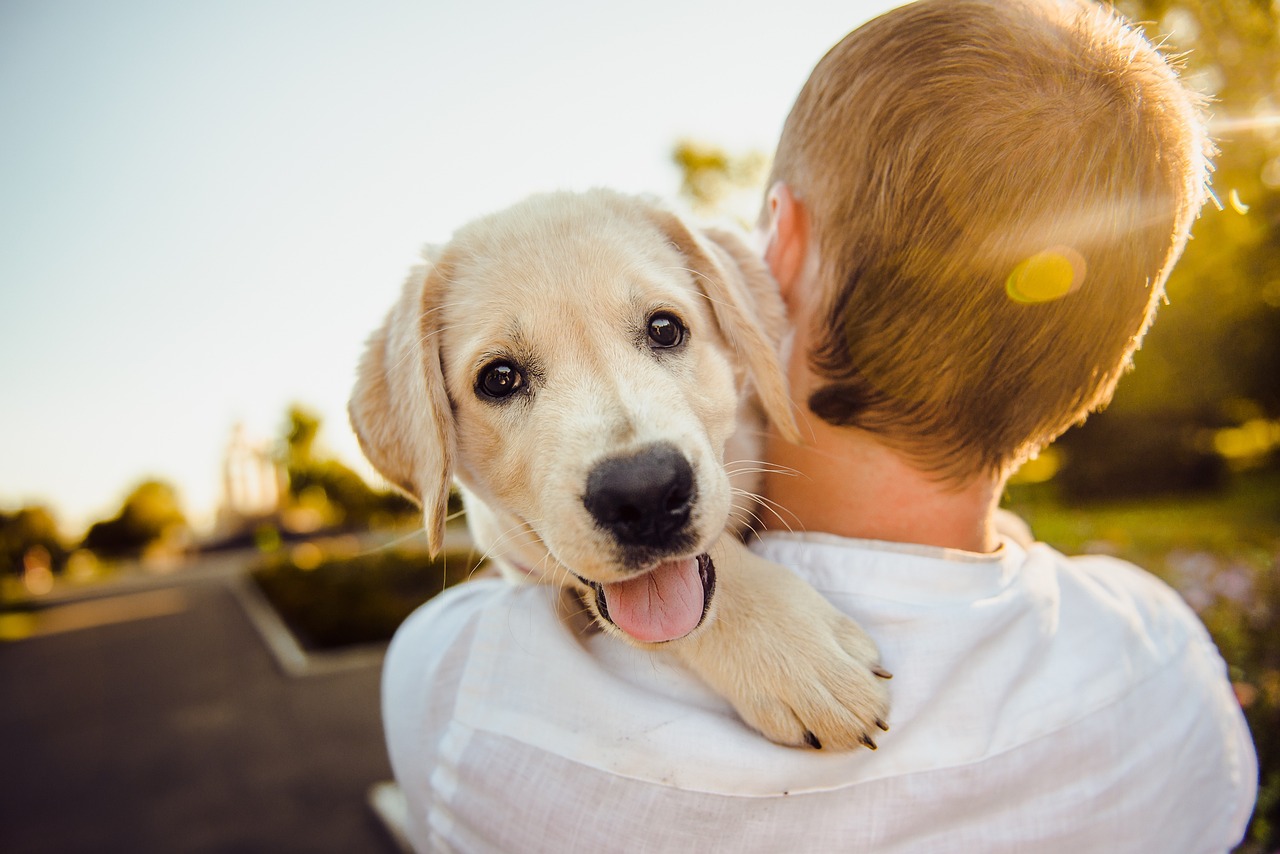How to Choose the Right Breed for Your Personality
Choosing a dog is more than just picking a cute face or a wagging tail; it's about finding a furry friend that truly resonates with your unique personality. Just like people, dogs come in all shapes, sizes, and temperaments. Understanding this connection can make a world of difference in ensuring that both you and your canine companion lead happy, fulfilling lives together. So, how do you go about selecting the right breed that aligns with your lifestyle and character traits? Let's dive into the fascinating world of dog breeds and personalities!
Dogs are as diverse as humans when it comes to personality traits. From the playful and energetic Labrador Retriever to the calm and composed Bulldog, each breed has its own set of characteristics that can significantly influence compatibility with different personality types. For instance, if you're someone who enjoys outdoor adventures and an active lifestyle, breeds that thrive on physical activity would likely be a great match. On the other hand, if you prefer cozy nights in with a good book, a more laid-back breed might be the perfect companion. Understanding these traits is essential for ensuring a harmonious relationship between you and your pet.
Before you can find the perfect pooch, it's crucial to take a moment to reflect on your own personality traits. Are you an active individual who loves to socialize, or do you lean towards a more introverted, relaxed lifestyle? Recognizing these aspects of your personality will guide you in selecting a breed that complements your way of life. Here are a few personality traits to consider:
- Activity Level: Do you enjoy running, hiking, or playing sports? Or do you prefer leisurely strolls in the park?
- Social Needs: Are you someone who thrives in social settings, or do you prefer quiet time at home?
- Temperament: Are you patient and calm, or are you more energetic and enthusiastic?
Your energy levels can play a significant role in determining the right breed for you. If you're a ball of energy, you might find joy in a high-energy breed that can keep up with your active lifestyle. Conversely, if you enjoy a more relaxed pace, a laid-back dog could be your ideal match. Let's break down the options:
High-energy breeds are known for their zest for life and require regular exercise and mental stimulation. These dogs thrive in environments where they can run, play, and engage in activities. Some popular high-energy breeds include:
- Border Collie: Renowned for their intelligence and agility.
- Australian Shepherd: A playful breed that loves to work and play.
- Jack Russell Terrier: Small but mighty, they are full of energy and enthusiasm.
On the flip side, low-energy breeds are perfect for those who prefer a more laid-back lifestyle. These dogs are content with short walks and plenty of cuddle time on the couch. Some examples of low-energy breeds are:
- Basset Hound: Known for their relaxed demeanor and love for lounging.
- Shih Tzu: A small breed that enjoys a calm environment.
- English Bulldog: Gentle and affectionate, they are perfect for a quieter lifestyle.
Your social preferences also play a vital role in your choice of dog breed. If you’re someone who loves to host gatherings or go out frequently, you might want a breed that’s friendly and sociable. Alternatively, if you prefer solitude or small gatherings, an independent breed might suit you better. It's essential to choose a dog that aligns with your interaction style to ensure both you and your pet are comfortable.
Another critical factor in choosing the right breed is your living situation. The size of your home, whether you live in an apartment or a house, and your family dynamics can greatly influence your decision. For instance, larger breeds often require more space to roam, while smaller breeds can thrive in compact living environments.
Consider how much space you have available for your new furry friend. If you live in a small apartment, a smaller breed that doesn't require much room to run around might be the best choice. On the other hand, if you have a large backyard and plenty of space, you might consider larger breeds that need more room to exercise.
It's also essential to consider the people and other pets in your household. Some breeds are more tolerant and friendly with children, while others may be more reserved. Ensuring that your new pet can coexist peacefully with your family members, including other pets, is crucial for a harmonious household.
Finally, understanding the temperament of different breeds can greatly affect their behavior and compatibility with your personality. While each dog is an individual, breed tendencies can provide insight into what to expect. Take the time to research various breeds and their typical temperaments to ensure a successful pet-owner relationship.
- What should I consider when choosing a dog breed? Think about your activity level, living situation, and social needs.
- Are all dog breeds suitable for families with children? No, some breeds are more tolerant and friendly with kids than others.
- How important is a dog's temperament? Very important! A dog's temperament can significantly impact your relationship.

Understanding Dog Breeds
This article explores the connection between dog breeds and individual personalities, providing insights into how to select a canine companion that aligns with your lifestyle and character traits.
When it comes to choosing a dog, understanding the different breeds available is crucial. Each breed comes with its own unique set of characteristics, behaviors, and needs, which can significantly influence how well they fit into your life. Imagine walking into a room full of different personalities; some are energetic and boisterous, while others are calm and reserved. Just like people, dogs have their own personalities shaped by their breed. For instance, a Labrador Retriever is known for its friendly and outgoing nature, making it a great companion for families, while a Shiba Inu tends to be more independent and may not be as eager to please. Understanding these traits helps ensure a harmonious relationship between you and your furry friend.
In addition to personality, different breeds also come with varying activity levels and temperaments. For example, breeds like Border Collies and Australian Shepherds are highly energetic and require significant exercise and mental stimulation. On the other hand, breeds like Bulldogs or Basset Hounds are more laid-back and can thrive in a less active environment. This distinction is vital because selecting a breed that matches your lifestyle can lead to a more fulfilling relationship. If you love hiking and outdoor adventures, a high-energy breed may be your perfect match. Conversely, if you prefer cozy nights on the couch, a low-energy breed might be the way to go.
Moreover, understanding the breed's temperament can help you anticipate how they will interact with you and your family. Some breeds are known for their loyalty and protective instincts, while others are more sociable and friendly towards strangers. For instance, breeds like Golden Retrievers are often characterized by their gentle and friendly demeanor, making them excellent family dogs. In contrast, breeds like Doberman Pinschers are known for their loyalty and protective nature, which can be a great fit for those looking for a companion that also serves as a guardian.
To further illustrate the diversity among dog breeds, let's take a look at a simple comparison table:
| Breed | Energy Level | Temperament | Ideal Owner |
|---|---|---|---|
| Labrador Retriever | High | Friendly, Outgoing | Families, Active Individuals |
| Shiba Inu | Medium | Independent, Alert | Experienced Owners |
| Bulldog | Low | Calm, Affectionate | Apartment Dwellers |
| Border Collie | Very High | Intelligent, Energetic | Active Individuals, Trainers |
Ultimately, understanding dog breeds is not just about knowing their characteristics but also about recognizing how these traits align with your own personality. The right breed will not only complement your lifestyle but also enhance your overall happiness and well-being. So, take your time, do your research, and find a canine companion that resonates with your unique personality.
Discover the importance of understanding your own personality traits, such as activity level, social needs, and temperament, which will guide you in selecting a breed that complements your lifestyle.
Explore how your energy levels and lifestyle choices can determine whether you should opt for a high-energy breed or a more relaxed companion, ensuring a good fit for both you and your dog.
Learn about breeds known for their high energy levels, which require regular exercise and stimulation, making them ideal for active individuals or families who enjoy outdoor activities.
Examine breeds that thrive in a more relaxed environment, perfect for those who prefer a quieter lifestyle or have limited mobility, ensuring a peaceful coexistence with their canine companions.
Understand how your social preferences can influence your choice of dog breed, whether you seek a social butterfly or a more independent companion, to match your interaction style.
Evaluate how your home environment, including space and family dynamics, plays a crucial role in selecting the right breed, ensuring that your new pet feels comfortable and secure in their surroundings.
Investigate how the size of your living space—apartment versus house—affects the suitability of certain breeds, helping you make an informed decision for a happy home.
Learn about the importance of considering family members, including children and other pets, when choosing a breed, ensuring a harmonious household where everyone feels safe and included.
Highlight the significance of understanding the temperament of different breeds, which can greatly affect their behavior and compatibility with your personality, leading to a successful pet-owner relationship.
Here are some common questions that people often ask when choosing the right dog breed:
- What is the best breed for families with children? Breeds like Golden Retrievers and Labradors are known for their friendly nature and adaptability.
- How do I know if a breed is right for my lifestyle? Consider your activity level, living situation, and whether you prefer a social or independent dog.
- Can I have a dog in a small apartment? Yes, but consider low-energy breeds that require less space to roam.
- What if I have other pets? Research breeds known for their compatibility with other animals to ensure a peaceful coexistence.

Identifying Your Personality Type
Choosing the right dog breed is not just about picking a cute face; it’s about finding a companion that truly aligns with your personality. Just like how we all have unique quirks and traits, so do dogs! Understanding your own personality type is crucial in making this decision. Are you the adventurous type who thrives on outdoor activities, or do you prefer cozy nights in with a good book? Knowing the answers to these questions will guide you toward a breed that complements your lifestyle.
Let’s break it down a bit. Think about your daily routine and how much energy you have. If you’re the kind of person who runs marathons or spends weekends hiking, you might benefit from a lively breed that can keep up with your pace. On the other hand, if you enjoy lounging on the couch and binge-watching your favorite series, a more relaxed dog might be your best bet. This isn’t just about energy levels, though; it’s also about your social needs. Do you thrive in social settings and enjoy meeting new people? Or do you prefer quiet, intimate gatherings? Understanding these aspects of your personality can help you find a dog that fits seamlessly into your life.
To make it easier, let’s consider a few key personality traits that can influence your choice:
- Activity Level: Are you active or laid-back?
- Social Needs: Do you enjoy being around people, or do you prefer solitude?
- Temperament: Are you patient and calm, or more energetic and spontaneous?
Once you’ve identified these traits, you can start to match them with dog breeds. For instance, if you’re an active person, you might look into breeds like Border Collies or Labrador Retrievers, known for their high energy and enthusiasm. Conversely, if you’re a homebody, breeds like Bulldogs or Basset Hounds could be the perfect fit, as they’re generally more relaxed and enjoy lounging around.
It’s like dating, really. You wouldn’t want to be with someone who doesn’t share your interests or lifestyle, right? The same goes for dogs. A mismatch can lead to frustration for both you and your furry friend. So, take the time to reflect on your personality before diving into the world of dog ownership. It’ll save you a lot of heartache and ensure that you find a loyal companion who truly fits your life.
Active vs. Laid-Back Personalities
When it comes to choosing a dog breed, one of the most crucial factors to consider is your own personality type. Are you the type of person who thrives on activity and adventure, or do you prefer a more relaxed, laid-back lifestyle? Understanding this distinction can significantly influence your choice of canine companion. Active individuals often find joy in breeds that match their high energy levels, while those with a more laid-back demeanor may seek out dogs that are content with a quieter existence.
Imagine your life as a vibrant tapestry woven with activities like hiking, running, or playing fetch in the park. If this resonates with you, then a high-energy breed might be your perfect match. Breeds such as Border Collies, Australian Shepherds, and Labrador Retrievers are known for their exuberance and require regular exercise to keep them happy and healthy. These dogs thrive in active households where they can participate in daily adventures. Without sufficient physical and mental stimulation, they may become bored and develop undesirable behaviors, like chewing or excessive barking.
On the flip side, if you find solace in cozy evenings at home with a good book or a movie, a low-energy breed could be more suitable for your lifestyle. Breeds like Bulldogs, Shih Tzus, and Basset Hounds are known for their calm demeanor and can be quite content with a short walk followed by a long nap on the couch. These dogs are perfect for individuals or families who prefer a slower pace and may not have the time or energy to engage in rigorous exercise routines.
To help you visualize the differences between these two types of personalities, consider the following table:
| Personality Type | Ideal Dog Breeds | Activity Level |
|---|---|---|
| Active | Border Collie, Labrador Retriever, Australian Shepherd | High |
| Laid-Back | Bulldog, Shih Tzu, Basset Hound | Low |
Ultimately, the key to a successful dog-owner relationship lies in finding a breed that complements your lifestyle. If you’re an active person, you’ll likely want a dog that can keep up with your pace, while if you lean towards a more relaxed lifestyle, a dog that enjoys lounging and occasional playtime will be your best friend. Remember, choosing a dog is not just about aesthetics; it’s about finding a companion that fits seamlessly into your daily life.
Q: How do I know if I am an active or laid-back person?
A: Consider your daily routines and preferences. Do you enjoy outdoor activities, or do you prefer staying indoors with a good book? Your lifestyle will give you clues about your personality type.
Q: Can I train a high-energy dog to be more relaxed?
A: While training can help manage a dog’s energy levels, it’s essential to remember that some breeds naturally have higher energy. It’s best to match a dog’s energy level with your lifestyle for long-term compatibility.
Q: What if my lifestyle changes over time?
A: If your lifestyle changes, you may need to reassess your dog’s needs. Some breeds adapt well to changes, while others may require more exercise or stimulation. Always be prepared to adjust your routine to ensure your dog remains happy and healthy.
High-Energy Breeds
When it comes to choosing a dog that matches your active lifestyle, can be the perfect fit. These dogs are not just pets; they are enthusiastic companions that thrive on activity and engagement. Imagine coming home after a long day, and instead of a couch potato waiting for your attention, you have a furry friend bouncing around, eager to join you for a run or a game of fetch. If you’re someone who loves outdoor adventures, hiking, or even just long walks in the park, these breeds will keep pace with your energy levels and enthusiasm.
High-energy breeds often require regular exercise and mental stimulation to stay happy and healthy. Without sufficient activity, they can become bored and may exhibit undesirable behaviors, such as chewing furniture or excessive barking. So, if you’re considering one of these lively pups, be prepared to invest time in their physical and mental well-being. Here are some popular high-energy breeds that you might consider:
- Border Collie: Renowned for their intelligence and agility, these dogs excel in obedience and agility sports.
- Australian Shepherd: Known for their herding instincts, they require plenty of exercise and thrive in active households.
- Labrador Retriever: Energetic and friendly, Labs love to play fetch and swim, making them great companions for outdoor enthusiasts.
- Jack Russell Terrier: Small but mighty, these little dogs are packed with energy and love to run and explore.
Each of these breeds has unique characteristics that cater to active individuals or families. For instance, the Border Collie is not only highly energetic but also incredibly intelligent, making them suitable for those who enjoy training and engaging their dogs in complex tasks. On the other hand, the Labrador Retriever is known for their friendly disposition and love for water activities, making them perfect for families who enjoy swimming or beach outings.
In addition to physical exercise, mental stimulation is equally important for high-energy breeds. This can include activities such as agility training, obedience classes, or interactive toys that challenge their problem-solving skills. By keeping their minds engaged, you can help prevent boredom and ensure a well-rounded, happy dog.
Ultimately, choosing a high-energy breed means embracing an active lifestyle. If you’re ready to match your energy levels with a dog that will keep you on your toes, these breeds can provide companionship that is both fulfilling and exhilarating. Just remember, they thrive on interaction and need you to be their partner in adventure!
Q: How much exercise do high-energy breeds need?
A: Most high-energy breeds require at least 1 to 2 hours of exercise daily, which can include walks, runs, playtime, and mental activities.
Q: Can high-energy breeds adapt to apartment living?
A: While some high-energy breeds can adapt to apartment living, they need plenty of outdoor exercise and mental stimulation to thrive in smaller spaces.
Q: Are high-energy breeds suitable for families with children?
A: Yes, many high-energy breeds are great with children, but supervision is essential to ensure safe play and interaction.
Low-Energy Breeds
When it comes to finding a furry friend that fits seamlessly into a more relaxed lifestyle, low-energy dog breeds are often the perfect choice. These breeds are typically characterized by their calm demeanor and lower exercise requirements, making them ideal companions for individuals or families who prefer a quieter home environment. Imagine coming home after a long day, ready to unwind with a loyal companion by your side, rather than a hyperactive pup bouncing off the walls! Low-energy breeds tend to enjoy leisurely walks, cozy cuddles, and the occasional game of fetch, rather than demanding rigorous play sessions.
One of the most popular low-energy breeds is the Bulldog. Known for their gentle and affectionate nature, Bulldogs are perfect for apartment living and can adapt well to smaller spaces. They are not big on exercise, making them a great choice for those who might have limited mobility or prefer a more laid-back lifestyle. Another breed that fits this category is the Basset Hound, with their distinctive droopy ears and soulful eyes. Basset Hounds are known for their easygoing nature and love of lounging around, making them excellent companions for those who enjoy a slower pace.
It's also worth mentioning the Shih Tzu, a small breed that thrives on companionship and is content with short walks and plenty of cuddle time. These little dogs are not only adorable but also bring joy to any home with their playful yet calm disposition. When considering a low-energy breed, it's essential to think about their temperament and how it aligns with your lifestyle. While they may not require as much physical activity, they still need mental stimulation and social interaction to keep them happy and healthy.
Here’s a quick look at some popular low-energy breeds and their characteristics:
| Breed | Characteristics |
|---|---|
| Bulldog | Gentle, affectionate, low exercise needs |
| Basset Hound | Easygoing, loves lounging, good with families |
| Shih Tzu | Playful, enjoys cuddling, short walks |
| Pug | Charming, sociable, enjoys short bursts of play |
In conclusion, low-energy breeds can offer a wonderful balance of companionship and tranquility. They are perfect for those who value a peaceful home and prefer to spend time relaxing rather than engaging in high-energy activities. As you consider which breed might be the best fit for you, remember that these dogs still require love, attention, and care. A calm dog can be just as fulfilling as a high-energy one, providing comfort and companionship that enriches your daily life. So, if you’re ready to embrace the joys of a low-energy canine companion, you might just find your perfect match waiting for you!
- What are low-energy dog breeds? Low-energy dog breeds are those that require less exercise and are generally more relaxed in nature, making them suitable for quieter lifestyles.
- Do low-energy breeds need exercise? Yes, while they require less exercise than high-energy breeds, low-energy dogs still need regular walks and mental stimulation to stay healthy.
- Are low-energy breeds good for families? Many low-energy breeds are excellent for families, especially those with young children, as they tend to be gentle and patient.
- Can low-energy breeds live in apartments? Absolutely! Many low-energy breeds adapt well to apartment living due to their smaller size and lower exercise needs.
Social Needs and Dog Breeds
When it comes to choosing the right dog breed, understanding your social needs is just as important as considering your lifestyle and activity level. Dogs, much like humans, have unique personalities and social preferences that can significantly impact their compatibility with you. Are you the life of the party, or do you prefer cozy nights in with a good book? Your social style will guide you in selecting a canine companion that aligns with your interaction preferences.
For those who thrive in social settings and enjoy being surrounded by friends and family, a breed known for its affectionate and outgoing nature might be the perfect match. Breeds like the Labrador Retriever or Golden Retriever are often characterized by their friendly demeanor and love for human interaction. These dogs are not just pets; they become part of the family, eagerly participating in gatherings and playdates. Their friendly disposition makes them great for families with children or those who frequently host guests.
On the flip side, if you identify more with a reserved personality or enjoy your alone time, you might want to consider breeds that are more independent. Dogs such as the Shiba Inu or Basenji are known for their self-sufficient nature and can thrive with less constant interaction. They might not demand your attention every hour of the day, allowing you to enjoy your quiet moments without feeling guilty. This doesn’t mean they don’t enjoy companionship; rather, they appreciate a more balanced approach to socialization.
It's also essential to think about how your social needs may change over time. For instance, if you frequently travel or work long hours, a breed that is more adaptable to solitude, like the French Bulldog, may be a better fit. Conversely, if you foresee a lifestyle shift towards more social activities, a breed known for its sociability could bring joy and excitement to your life.
To help you better understand how different breeds align with social needs, here’s a quick overview:
| Breed | Social Nature | Best For |
|---|---|---|
| Labrador Retriever | Highly social and friendly | Families, active individuals |
| Shiba Inu | Independent and reserved | Individuals who enjoy solitude |
| Golden Retriever | Affectionate and playful | Families, social butterflies |
| French Bulldog | Adaptable and calm | Busy professionals, apartment dwellers |
Ultimately, the key to a successful pet-owner relationship lies in understanding these social dynamics. By aligning your social needs with the right breed, you can foster a bond that is not only fulfilling but also enhances your lifestyle. So, take a moment to reflect on your social preferences, and let them guide you in choosing a furry friend who will complement your world.
- How do I know if a dog is social or independent? Research the breed's characteristics and ask breeders or shelters about individual dog's personalities.
- Can I change a dog's social behavior? While some traits are inherent, socialization training can help dogs adapt to new environments and interactions.
- What if I have a busy lifestyle? Consider breeds that are more independent or can adapt to being alone for longer periods.

Assessing Your Living Situation
When it comes to choosing the right dog breed, one of the most crucial factors to consider is your living situation. After all, your home is where both you and your new furry friend will spend a significant amount of time together. Think about it: if you're living in a tiny apartment with no yard, adopting a large, high-energy breed might not be the best idea. Conversely, if you have a spacious home with a big backyard, a more active breed could thrive in that environment. It's all about finding the perfect match that ensures both you and your dog are happy and comfortable.
First off, let's talk about space considerations. The size of your living space can greatly influence the type of breed you should consider. For example, smaller breeds like Chihuahuas or French Bulldogs can adapt well to apartment living, as they don’t require as much space to roam. On the other hand, larger breeds such as Golden Retrievers or Great Danes typically need more room to stretch their legs. If you live in a smaller environment, you might want to consider breeds that are known for being more compact and less active.
Moreover, your home environment should also reflect your lifestyle. If you're someone who enjoys hosting friends and family, you might want a breed known for its sociable nature. Breeds like Labrador Retrievers or Beagles are often friendly and enjoy being around people, making them perfect for a lively household. However, if you prefer a quieter home, a more independent breed like a Shiba Inu or a Bulldog might be a better fit. It's essential to think about how your dog will fit into your daily life, including your social interactions and activities.
Next, consider your family dynamics. If you have children or other pets, it's vital to choose a breed that is known to be good with kids or compatible with other animals. For example, breeds like Collies and Boxers are known for their gentle nature and can be great companions for children. On the flip side, some breeds may not tolerate the boisterousness of kids or the presence of other pets. It’s important to do your research and understand the temperament of the breed you’re considering, as this will help ensure a harmonious household where everyone feels safe and included.
In summary, assessing your living situation is a critical step in choosing the right dog breed. By considering factors such as space, lifestyle, and family dynamics, you can make an informed decision that will lead to a happy and fulfilling relationship with your new canine companion. Remember, a well-matched dog can bring joy and companionship into your life, but a poor match can lead to stress for both you and your pet. So take the time to evaluate your living conditions and choose wisely!
- What size dog is best for apartment living? Smaller breeds like French Bulldogs, Pugs, and Dachshunds tend to adapt well to apartment life.
- Can I have a dog if I work full-time? Yes, but consider breeds that are more independent or look into doggy daycare options to ensure they get enough socialization and exercise.
- How do I know if a breed is good with kids? Research the breed's temperament and look for breeds known for their gentle nature, such as Golden Retrievers or Beagles.
- What if I have other pets? Choose a breed that is known to be friendly and tolerant of other animals, and consider introducing them in a controlled environment.
Space Considerations
When it comes to choosing the right dog breed, one of the most crucial factors to consider is your living space. The size and layout of your home can significantly influence the happiness and well-being of your new furry friend. Imagine trying to fit a large, energetic breed into a tiny apartment—it's like trying to fit an elephant into a mini cooper! Each breed has unique needs, and understanding these can help ensure that you and your dog can coexist comfortably.
If you live in a small apartment, you might want to consider breeds that are known for their adaptability to limited space. Breeds like the French Bulldog or the Cavalier King Charles Spaniel thrive in smaller environments, as they are generally lower-energy and enjoy lounging around. On the other hand, if you have a large house with a backyard, you can accommodate larger, more active breeds like the Labrador Retriever or the Border Collie, who require more room to run and play.
Here's a quick overview of how different living spaces can impact your choice of breed:
| Living Space Type | Suitable Dog Breeds | Considerations |
|---|---|---|
| Small Apartment | French Bulldog, Cavalier King Charles Spaniel, Pug | Low energy, minimal exercise needs |
| Medium-Sized House | Beagle, Cocker Spaniel, Shih Tzu | Moderate exercise, some outdoor space preferred |
| Large House with Yard | Labrador Retriever, German Shepherd, Border Collie | High energy, requires plenty of exercise and space |
Additionally, consider the layout of your home. Is it open and spacious, or is it more cramped and segmented? Dogs appreciate the ability to roam freely, so a home with open areas can be beneficial for breeds that enjoy exploring. If your space is limited, think about how you can create a comfortable area for your dog to relax and play, perhaps by setting up a cozy nook with their bed and toys.
Ultimately, the goal is to create an environment where your dog can thrive. A well-suited living space not only enhances your dog's quality of life but also contributes to a more harmonious household. Remember, a happy dog leads to a happy owner!
- What dog breed is best for apartment living? Breeds like French Bulldogs and Pugs are excellent choices due to their adaptability and lower energy levels.
- How much space does a large dog need? Large dogs typically benefit from having access to a yard or open space where they can run and play freely.
- Can I have more than one dog in a small space? Yes, but it's essential to choose breeds that are compatible with each other and your living situation.
Family Dynamics
When it comes to choosing the right dog breed, understanding is absolutely crucial. After all, your home is not just about you; it’s a lively mix of personalities, ages, and preferences. Have you ever thought about how your dog will fit into this bustling environment? It’s essential to consider not only your own lifestyle but also the needs of your family members, including children and other pets. The right breed can enhance harmony in your household, while the wrong choice can lead to chaos and stress.
For families with young children, selecting a breed known for its gentle temperament is vital. Breeds like Golden Retrievers and Labrador Retrievers are often recommended because they are typically patient and friendly. They can handle the unpredictable nature of kids, making playtime fun and safe. On the other hand, if you have older children or teenagers, you might consider a breed that can keep up with their energy levels, such as a Border Collie or a Australian Shepherd. These breeds are not only intelligent but also love to engage in active play, which can be a great bonding experience.
But what if you have other pets? It's crucial to assess how a new dog will interact with your existing furry family members. Some breeds are naturally more dominant or territorial, which can lead to conflicts. For instance, if you already have a cat, breeds like Beagles or Boxers may be more suitable, as they are generally known to be more tolerant of other animals. Conversely, some breeds, such as Terriers, may have a strong prey drive and could view smaller pets as targets. It’s all about finding that balance where everyone feels safe and included.
Additionally, consider the energy levels of your family. If you have a laid-back household, a calm dog breed like a Bulldog or a Basset Hound might be a better fit. These breeds are known for their relaxed demeanor and can thrive in a quieter environment. However, if your family is always on the go, a more energetic breed like a Vizsla or a Jack Russell Terrier could be the perfect match, keeping up with your busy lifestyle and providing endless entertainment.
In summary, understanding family dynamics is key to choosing a dog that not only fits your personality but also meshes well with the rest of your household. Take the time to assess your family’s needs, preferences, and lifestyle. This thoughtful approach will not only ensure a smoother transition for your new pet but also create a joyful and loving environment for everyone involved.
- What is the best dog breed for families with young children?
Breeds like Golden Retrievers and Labrador Retrievers are often great choices due to their friendly and patient nature. - How can I ensure my new dog gets along with my existing pets?
Research breeds that are known for their tolerance and compatibility with other animals, such as Beagles or Boxers. - What should I consider if I have a laid-back lifestyle?
Look for calm breeds like Bulldogs or Basset Hounds that thrive in a quieter environment. - Are there dog breeds that are better for active families?
Yes! Breeds like Vizslas and Jack Russell Terriers are energetic and love to engage in play and outdoor activities.

Researching Breed Temperament
When it comes to choosing a dog, understanding breed temperament is crucial. Just like humans, each dog breed has its own unique personality traits that can significantly affect how well they fit into your life. Imagine bringing home a dog that’s overly energetic when you prefer a calm evening on the couch; it could lead to a mismatch that leaves both you and your furry friend feeling frustrated. So, how do you go about finding the right temperament for your lifestyle?
First, it’s essential to recognize that temperament is influenced by a combination of genetics, upbringing, and environment. Some breeds are naturally more affectionate and social, while others may be more reserved or independent. For example, Golden Retrievers are often known for their friendly and gentle demeanor, making them excellent family pets. In contrast, breeds like the Shiba Inu may exhibit a more aloof personality, which could be a better fit for someone who values independence in their canine companion.
To help you get a clearer picture, let's take a look at a few common breed temperaments:
| Breed | Common Temperament Traits |
|---|---|
| Golden Retriever | Friendly, Intelligent, Loyal |
| Beagle | Curious, Friendly, Merry |
| Bulldog | Calm, Courageous, Gentle |
| Shiba Inu | Alert, Independent, Confident |
As you can see, different breeds come with a spectrum of behaviors that can either enhance or complicate your day-to-day life. Therefore, it’s essential to think about what kind of temperament will complement your own personality and lifestyle. For instance, if you’re an active person who enjoys hiking and outdoor adventures, a breed like a Border Collie or a Labrador Retriever might be the perfect match. These dogs thrive on activity and will keep you motivated to stay active.
On the flip side, if you lead a more relaxed lifestyle and enjoy quiet evenings at home, a breed like a Bulldog or a Basset Hound could be more suitable. These breeds are generally more laid-back and can adapt well to a slower-paced life. Remember, it’s not just about the breed itself but also about how their natural traits align with your daily routine and preferences.
Another factor to consider is how a dog's temperament can change over time. Puppies are often more energetic and playful, but as they grow, their personalities can mellow out. Additionally, factors like training, socialization, and even your own behavior can shape how a dog interacts with the world. Therefore, investing time in training and socializing your dog can lead to a more balanced and well-adjusted pet.
In conclusion, researching breed temperament is a vital step in ensuring a harmonious relationship with your future pet. By understanding the unique traits of different breeds and considering how they align with your personality, you can make an informed decision that enhances both your life and the life of your furry companion.
- What is the most important factor in choosing a dog breed? Understanding your lifestyle and how it matches with a breed's temperament.
- Can a dog’s temperament change over time? Yes, training, socialization, and environment can greatly influence a dog's behavior.
- How can I learn more about a specific breed's temperament? Research breed-specific characteristics, talk to breeders, and consult with dog trainers.
Frequently Asked Questions
- What factors should I consider when choosing a dog breed?
When selecting a dog breed, it's essential to consider your lifestyle, activity level, living space, and family dynamics. Think about how much time you can dedicate to exercise and training, as well as your social needs and whether you prefer a more independent or sociable dog.
- How do I know if I have a high-energy or low-energy personality?
Assess your daily activities and preferences. If you enjoy outdoor adventures, running, or regular exercise, you might have a high-energy personality. Conversely, if you prefer relaxing at home, reading, or taking leisurely walks, you may lean towards a low-energy lifestyle.
- What are some examples of high-energy dog breeds?
High-energy breeds include the Border Collie, Australian Shepherd, and Labrador Retriever. These dogs require plenty of physical activity and mental stimulation to stay happy and healthy, making them ideal for active individuals or families.
- Can low-energy breeds still enjoy playtime?
Absolutely! Low-energy breeds, such as Bulldogs or Basset Hounds, still enjoy playtime, but their activity levels might be shorter and less intense. They often prefer gentle games and short walks, fitting perfectly into a more relaxed lifestyle.
- How does my living situation affect my choice of dog breed?
Your living situation plays a crucial role in determining the right breed for you. If you live in a small apartment, you might want to consider smaller breeds that require less space. On the other hand, larger breeds might thrive in homes with spacious yards.
- What should I consider regarding family dynamics when choosing a dog?
When selecting a breed, consider the ages of your family members, any other pets, and their personalities. Some breeds are great with kids and other animals, while others may be more reserved or territorial. It's vital to ensure that everyone in the household feels safe and comfortable with the new addition.
- How important is breed temperament in the selection process?
Breed temperament is incredibly important! Understanding the general behavior and personality traits of different breeds can help you find a dog that aligns with your lifestyle and personality, leading to a happier and more successful pet-owner relationship.



















